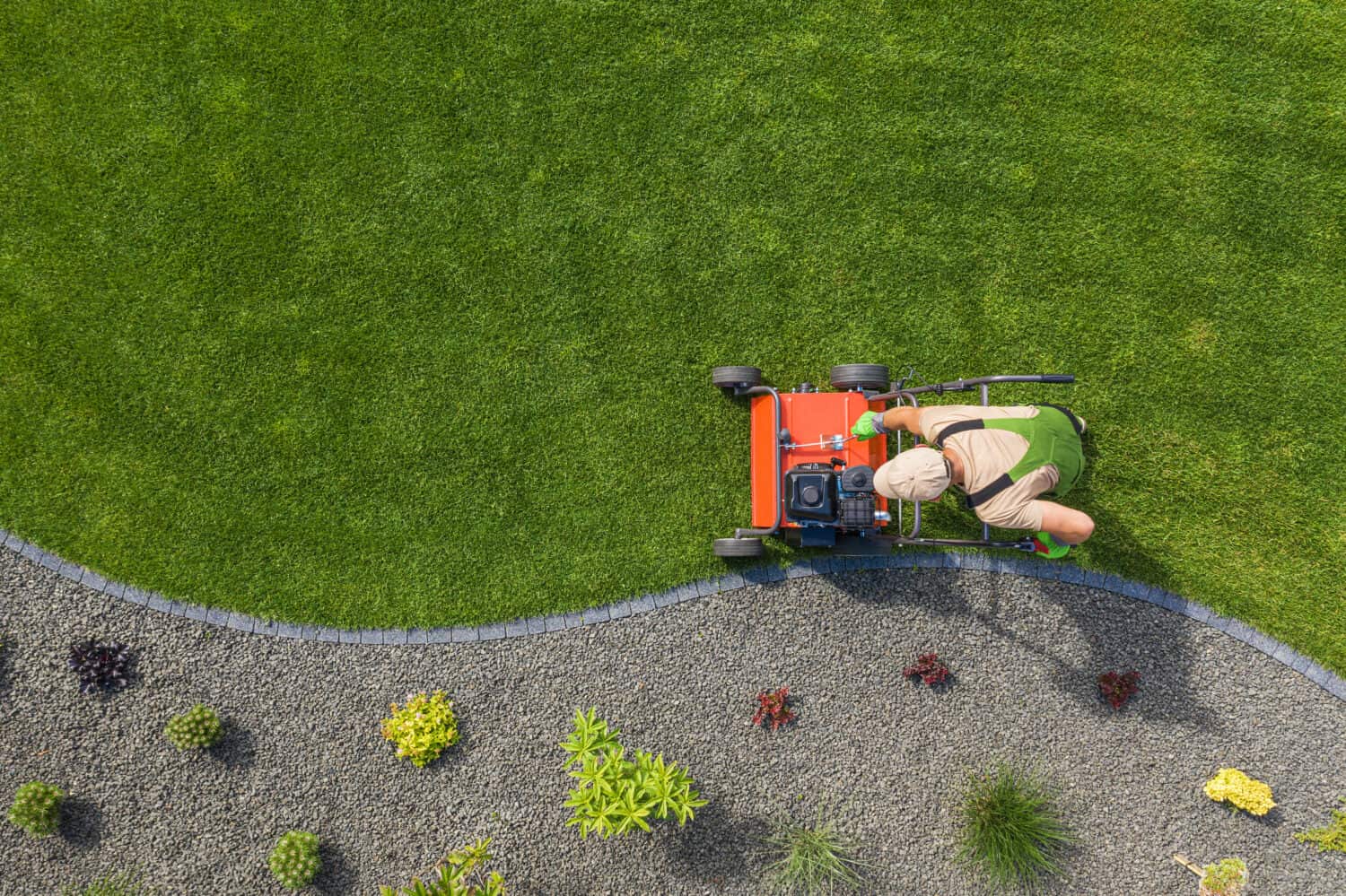The main disadvantage of organic mulch is it attracts termites and bugs. Also, since it decomposes, it is a high-maintenance solution that you need to reapply every few years. Therefore, it is also costly. You may want to avoid putting organic mulch in your yard because it may turn out to be more of a hassle than a fun project.
Mulch is an important component of landscaping. It is equal parts a style statement and a way to provide nutrients and protection for your yard. It helps retain soil moisture, regulate drainage, create a barrier against extreme weather like temperature or wind, prevent weed growth, and reduce yard erosion. A mulch of any kind gives a yard a clean and uniform look, and can even add pops of color or texture to landscapes. Landscaping with mulch gives yards a well-maintained look.
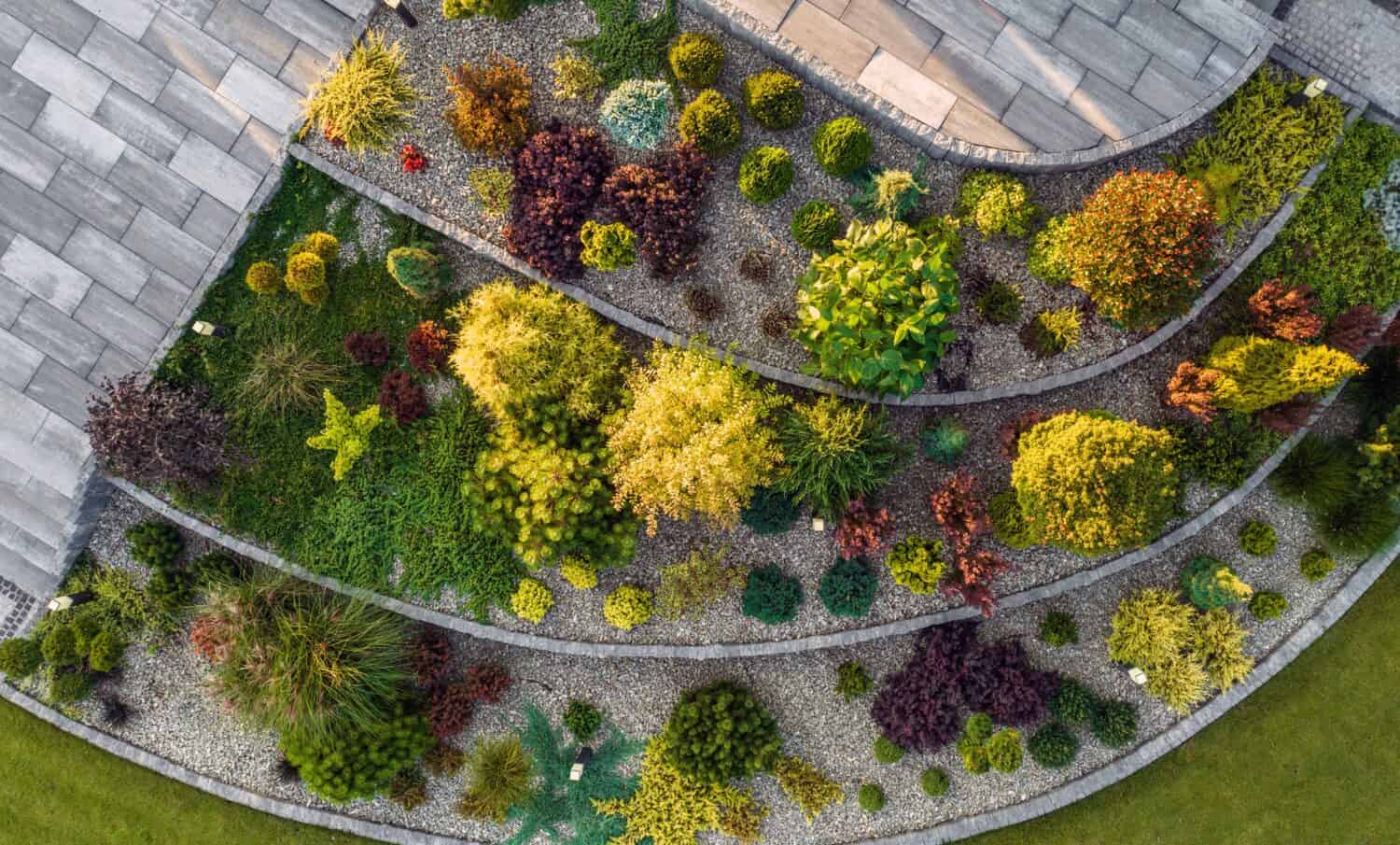
Inorganic mulch, such as rocks, gives yards a clean and edgy look.
©Virrage Images/Shutterstock.com
General Benefits Of Applying Mulch
Though different mulches offer different benefits, mulch itself is the right path to take when sprucing up your lawn. Here are some general benefits of why mulch is a needed accessory:
- Keeps soil most
- Prevents weed growth
- Encourages root growth
- Prevents soil compaction
- Protects from mowing damage
- Reduces erosion
- Prevents the spread of soil diseases
- Adds curb appeal
- Keeps soil temperatures stable
What is Organic Mulch v. Inorganic Mulch?
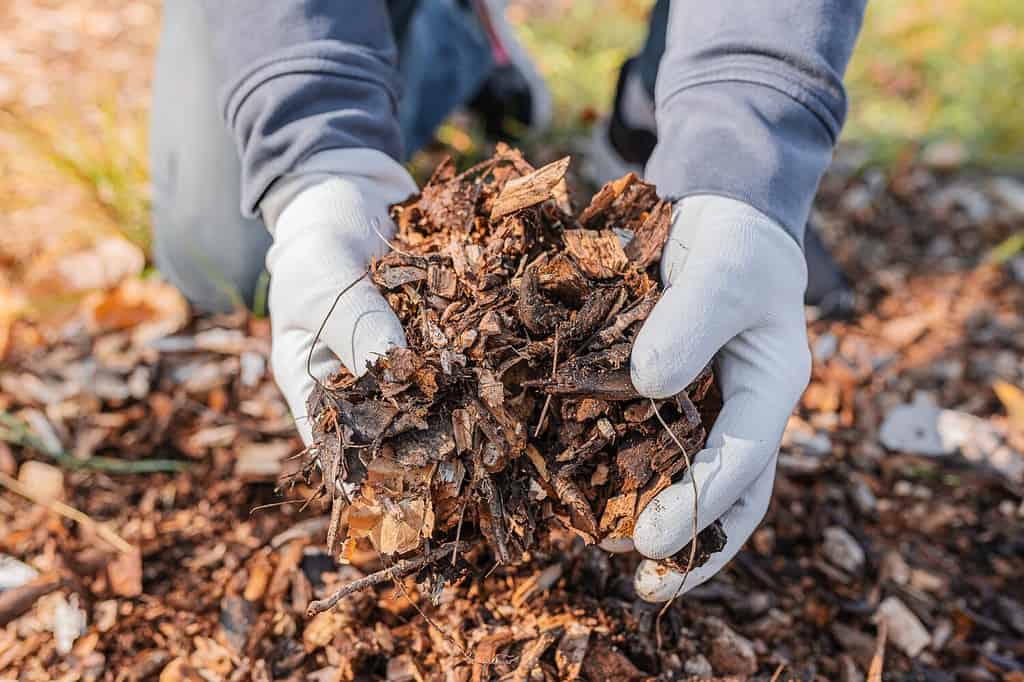
Organic mulch can be made from wood chips and tree bark in combination with other formerly living matter such as leaves.
©larisa Stefanjuk/Shutterstock.com
Organic mulch originates from living materials. It can consist of woodchips, grasses, leaves, straw, shredded bark, pine needles, plant byproducts like cardboard or paper, and even compost. These are considered organic materials because they break down over time and are incorporated back into the soil.
Inorganic mulch are materials such as rock, stone, and man-made products like plastic sheeting, rubber bark, or geotextile landscape fabric. These mulch materials are usually more durable. They don’t need to be replenished as often, and some not at all.
The drawbacks that come with organic mulch are enough to make you reconsider your landscaping plans. Here are the top five reasons why you may want to reconsider landscaping your yard with organic mulch.

1. Decomposition Leads to Higher Cost And More Labor
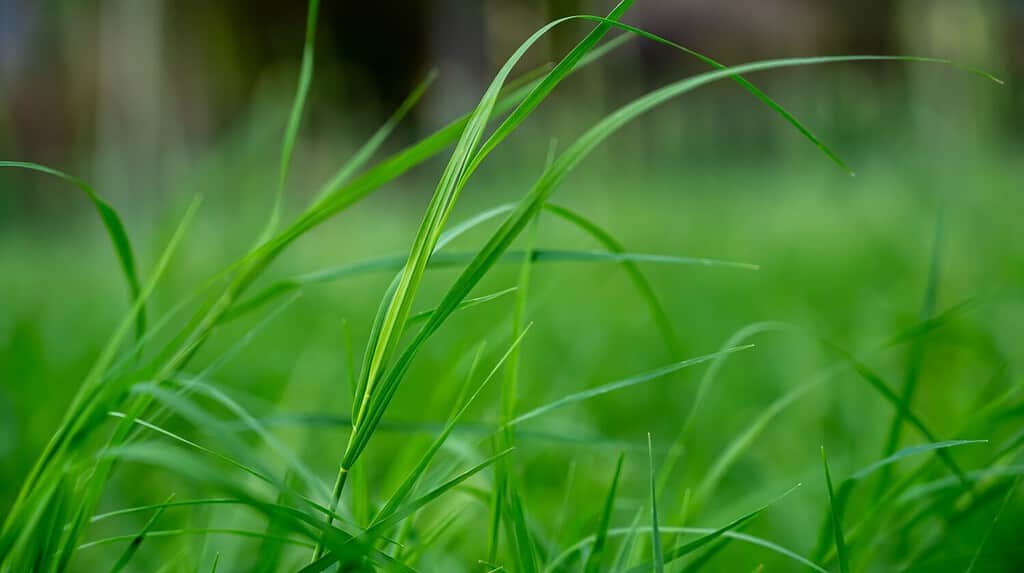
Pine needles and wood chips last a couple of years. However, grass clippings and straws need replacing annually.
©PrivinSathy/Shutterstock.com
Organic mulches decompose. This means you need to reapply them to your yard every season. It can get expensive and laborious. And even if it’s not every season, it’s at least every few years. It just depends on which organic material you were to choose. Pine needles and wood chips last a couple of years. However, grass clippings and straws need replacing annually. If you just avoid putting any organic mulches in your law, you can avoid this unneeded cost and chore.
Organic mulches like burlap and cardboard will decompose over time, which means they aren’t permanent installations either. You will need to replace the materials because they simply won’t be in your yard anymore.
2. Organic Mulches Attract Pests
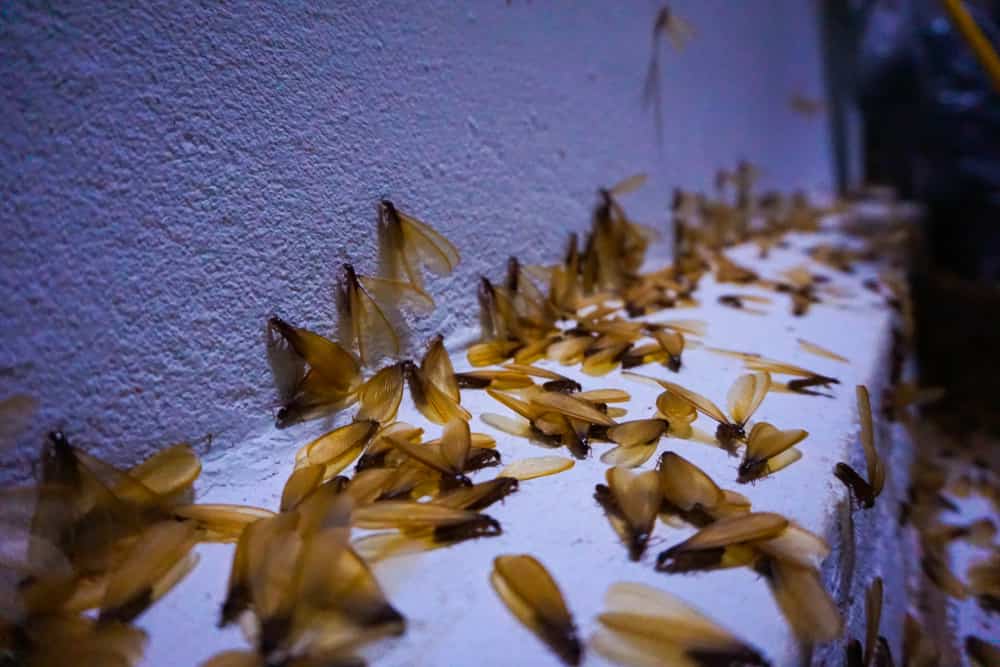
Termites are detrivores and typically eat large amounts of wood and dead plant material.
©Panomluttikorn Junsiri/Shutterstock.com
Organic mulch doesn’t repel insects like inorganic mulch. Since it is made from living materials, it can attract pests like termites and roaches. These pests are attracted to moisture, and organic wood mulches retain water and stay moist. This means if wood mulch is placed around the foundation of your house, you are putting up a neon sign to welcome termites to an all-you-can-eat buffet. Organic mulches like straw provide an excellent hiding space for pest critters and insects as well.
3. May Not Be As Sustainable As You Believe
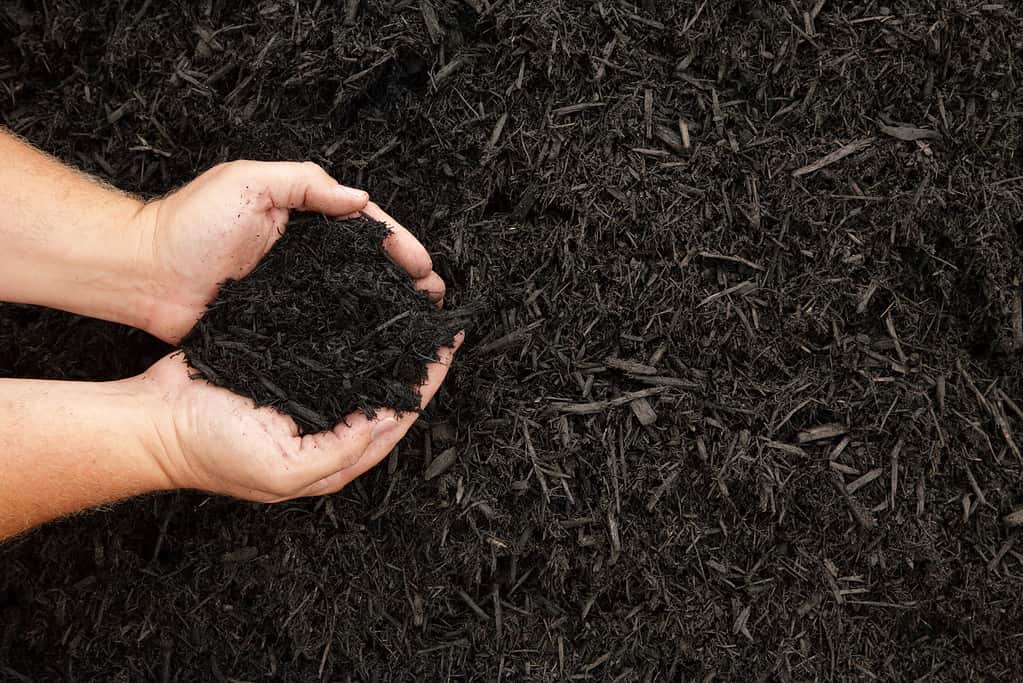
Hands displaying a handful of dark wood bark mulch
©iStock.com/witmerphotography
You may want to use organic mulches because you want to do your part in helping the environment. However, this may not be the case. These mulches contain a high concentration of materials from trees and are not that sustainable. The products can be dyed with chemicals, or even sprayed with herbicides. Whereas, on the flip side, rocks and pebbles are considered inorganic but are natural.
Certain woods like cedar are toxic to animals, and dense bark mulches will leave gardens unpollinated. Ground-dwelling bees and bumblebees won’t burrow through dense bark. Compost can also be harmful to plants if it contains high levels of nitrogen. You have to be sure animal manure compost is aged well (or very smelly!), and you even have to avoid compost from dogs, cats, and pigs. They carry pathogens that are harmful to humans. It is a lot of work to figure out the right compost or bark to use in a mulch when you can just use an inorganic mulch that takes less work and money.
Other organic mulch that contains synthetic and harmful materials can be cardboard or paper. You can’t let these materials decompose into the ground if they aren’t made from 100% biodegradable materials, which, again, cost a pretty penny. Just avoid putting organic mulch in your yard if you don’t know its makeup.
4. Can Deplete the Soil

©larisa Stefanjuk/Shutterstock.com
Although organic soil breaks down and puts itself back into the ground, you still should avoid putting the materials in your yard because this breaking down robs the soil of its nitrogen. Organic materials like wood compete with plants for nitrogen as it decomposes. You need to add more fertilizer to your landscape to try to stop this competition, however, it is just one extra step and if forgotten, then it is over for your yard. Organic mulches can’t be used all over your yard because of the depletion. For instance, wood chips may work around trees and shrubs, but can’t be applied in gardens or flower beds. Again, this means more work for you when you could be using one inorganic material for your whole yard.
Other organic mulches can even form solid mats across the soil. This is counterproductive and smothering. Leaves can easily do this to lawns, and what’s worse is that this organic mulch is seasonal. Its’ supply can only be found at certain times of the year unless you can figure out a way to store your collected leaves.
5. Doesn’t Repress Weeds, Can Contain Weed Seed
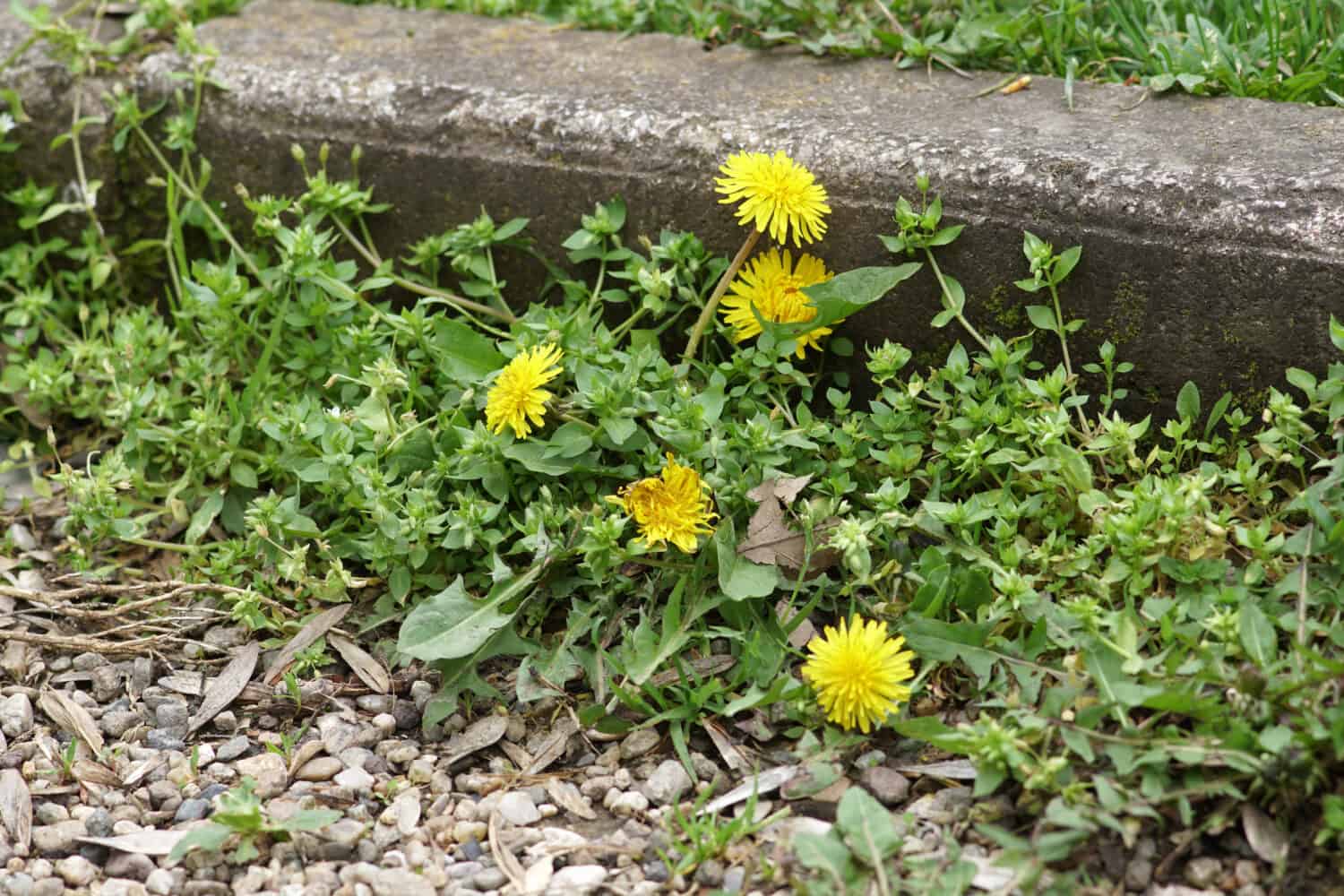
Organic mulch contains weed seed which is just frustrating for someone who landscaped their yard only to find their mulch betrayed them!
©Aleksandar Cholanchevski/Shutterstock.com
Organic mulch can invite weeds and unwanted plants into your yard. An organic mulch that is not effective at fighting weeds is compost. It is only effective if it is applied in a substantially thick layer, which means more money and more labor once again. Also, your work may be counterproductive. Organic mulches like straw, hay, and grass clippings contain weed seeds. This is just plain frustrating for owners who applied mulch for the sole purpose of getting rid of weeds.
Hay is the biggest culprit. It almost always contains weed seeds, and sometimes quite noxious ones. The mulch basically grows weeds instead of reducing them. You have to seek out organic, pesticide-free, seed-free straw, which may be a hassle and will definitely be an expense.
Alternatives to Organic Mulch For Your Yard
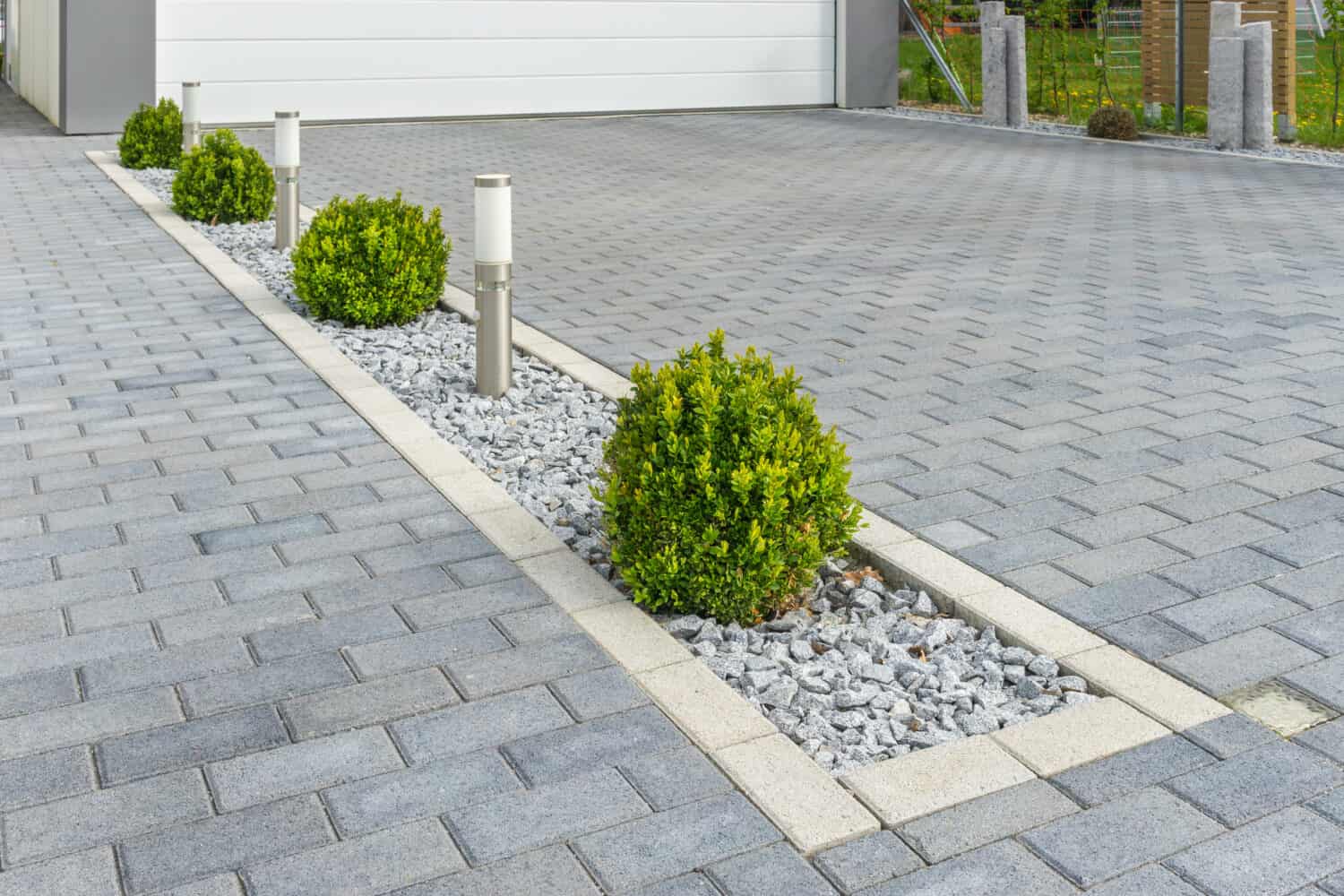
Image: ThomBal, Shutterstock
©ThomBal/Shutterstock.com
There are many alternatives to organic mulch, and they aren’t all man-made and full of chemicals like some would like you to believe. They also don’t require seasonal reapplication and don’t smell like organic mulch.
Inorganic mulch is a more permanent solution for landscaping. They don’t decompose which can save you time and money. These mulches also don’t attract pests that can kill your lawn, and waste all of your hard work.
Benefits of Inorganic Mulch:
- Long-lasting
- Doesn’t include weed seeds
- Eye-catching
- Versatile
- Doesn’t deplete nitrogen in the soil
- Prevents pests
Here are some of the most commonly used mulch alternatives and what you need to know to make the best decision for your landscaping needs.
Gravel, Pebbles, and River Rocks
Any type of stone mulching does a great job at preventing pests, and at the same time, is an attractive, weed-resistant mulch that requires minimal maintenance. A pro-tip when using rocks is if you have acid-loving plants, steer clear of limestone gravel. Limestone raises the soil’s pH level and kills those plants. But you can use other gravel or stones that don’t raise the pH level and you are home-free!
Rock gravel or rock mulch in general is also one of the most durable and long-lasting mulch options. After your initial purpose and installation, it does not need to be replenished unless you want to change the look. Also, due to the weight of the mulch, most rocks and gravel don’t get disturbed by extreme weather. The inorganic mulch looks clean and sharp on a lawn and is great for pathways, between garden beds, or in open spaces.
Black Plastic
Black plastic or black polyethylene prevents weeds and can be buried under a more eye-catching mulch like rubber or stone. It does require a bit of work because you will need to cut holes in the plastic to encourage the flow of moisture.
This inorganic mulch warms the soil and radiates heat to plants overnight. This ability gives plants a boost in the early spring or even allows them to survive longer into the fall.
Landscape Fabric
Geotextiles, or landscape fabric, suppress weeds and encourages a free flow of air and moisture. This mulch can also be buried under a decorative mulch for visual appeal, but it continues to do the job of protecting your landscaping.
Reflective Metallic Mulch
If you live in an area where pests are rampant, you may want to consider reflective mulches. They look out of this world, but they repel insects like it is their job! Their shiny coat essentially put out the bat signal for pests to fly on by. Again, this mulch does need a little bit of extra prep work, but it doesn’t require much maintenance after installation. You do need to cut holes in the mulch for planting and install a drip irrigation system to ensure that plant roots get water.
Rubber Mulch
One of the newer mulches is rubber mulch. It is made of recycled rubber from tires and improves your soil’s moisture retention, controls erosion, and even keeps the soil warm in the winter. It is also sturdy, so it will stay put during dangerous weather, and it resists decomposition.
| Alternative | Why It’s Better |
|---|---|
| Reflective Metallic Mulch | Repels insect invaders |
| Rocks and Stones | Controls weeds and resists soil compaction and wind erosion; decorative and eye-catching |
| Landscape Fabric | Suppresses weeds while also encouraging a free flow of air and moisture |
| Rubber Mulch | Improves soil moisture retention, controls erosion, and keeps the soil warm in the winter; resists decomposition |
| Black Plastic | Prevents weeds in gardens |
Summary of 5 Reasons to Avoid Organic Mulch In Your Yard
| Number | Reason to Avoid Organic Mulch in Your Yard |
|---|---|
| 1 | Decomposition Leads to Higher Cost And More Labor |
| 2 | Organic Mulches Attract Pests |
| 3 | May Not Be As Sustainable As You Believe |
| 4 | Doesn’t Repress Weeds, Can Contain Weed Seed |
| 5 | Can Deplete the Soil |
Thank you for reading! Have some feedback for us? Contact the AZ Animals editorial team.

